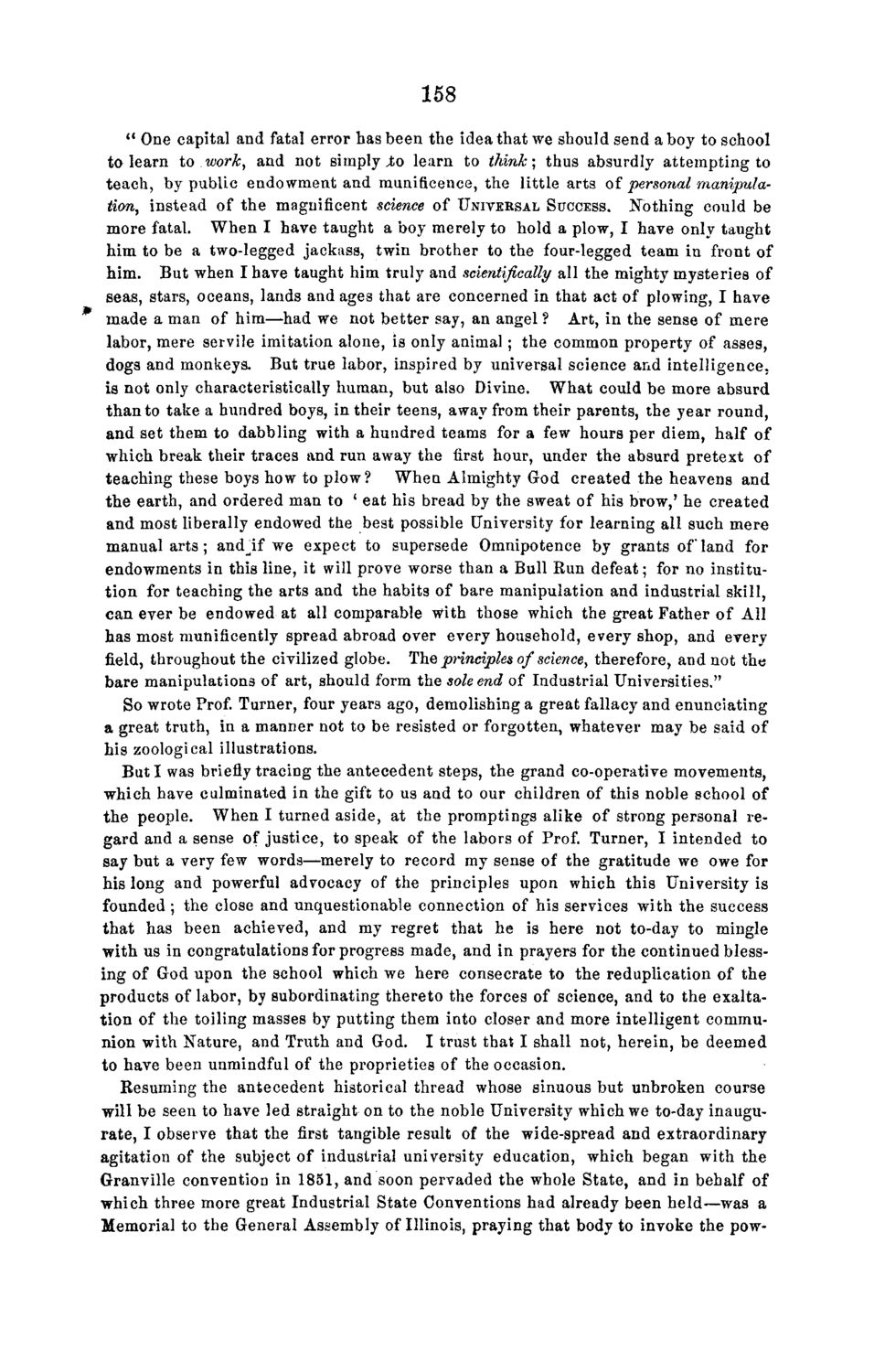| |
| |
Caption: Board of Trustees Minutes - 1868
This is a reduced-resolution page image for fast online browsing.

EXTRACTED TEXT FROM PAGE:
158 " One capital and fatal error has been the idea that we should send a boy to school to learn to work, and not simply Xo learn to think; thus absurdly attempting to teach, by public endowment and munificence, the little arts of personal manipulation, instead of the magnificent science of UNIVERSAL SUCCESS. Nothing could be more fatal. When I have taught a boy merely to hold a plow, I have only taught him to be a two-legged jackass, twin brother to the four-legged team in front of him. But when I have taught him truly and scientifically all the mighty mysteries of seas, stars, oceans, lands and ages that are concerned in that act of plowing, I have made a man of him—had we not better say, an angel ? Art, in the sense of mere labor, mere servile imitation alone, is only animal; the common property of asses, dogs and monkeys. But true labor, inspired by universal science and intelligence, is not only characteristically human, but also Divine. What could be more absurd than to take a hundred boys, in their teens, away from their parents, the year round, and set them to dabbling with a hundred teams for a few hours per diem, half of which break their traces and run away the first hour, under the absurd pretext of teaching these boys how to plow? When Almighty God created the heavens and the earth, and ordered man to * eat his bread by the sweat of his brow,' he created and most liberally endowed the best possible University for learning all such mere manual arts; and^if we expect to supersede Omnipotence by grants of land for endowments in this line, it will prove worse than a Bull Run defeat; for no institution for teaching the arts and the habits of bare manipulation and industrial skill, can ever be endowed at all comparable with those which the great Father of All has most munificently spread abroad over every household, every shop, and every field, throughout the civilized globe. The principles of science, therefore, and not the bare manipulations of art, should form the sole end of Industrial Universities." So wrote Prof. Turner, four years ago, demolishing a great fallacy and enunciating a great truth, in a manner not to be resisted or forgotten, whatever may be said of his zoological illustrations. But I was briefly tracing the antecedent steps, the grand co-operative movements, which have culminated in the gift to us and to our children of this noble school of the people. When I turned aside, at the promptings alike of strong personal regard and a sense of justice, to speak of the labors of Prof. Turner, I intended to say but a very few words—merely to record my sense of the gratitude we owe for his long and powerful advocacy of the principles upon which this University is founded; the close and unquestionable connection of his services with the success that has been achieved, and my regret that he is here not to-day to mingle with us in congratulations for progress made, and in prayers for the continued blessing of God upon the school which we here consecrate to the reduplication of the products of labor, by subordinating thereto the forces of science, and to the exaltation of the toiling masses by putting them into closer and more intelligent communion with Nature, and Truth and God. I trust that I shall not, herein, be deemed to have been unmindful of the proprieties of the occasion. Resuming the antecedent historical thread whose sinuous but unbroken course will be seen to have led straight on to the noble University which we to-day inaugurate, I observe that the first tangible result of the wide-spread and extraordinary agitation of the subject of industrial university education, which began with the Granville convention in 1851, and soon pervaded the whole State, and in behalf of which three more great Industrial State Conventions had already been held—was a Memorial to the General Assembly of Illinois, praying that body to invoke the pow-
| |